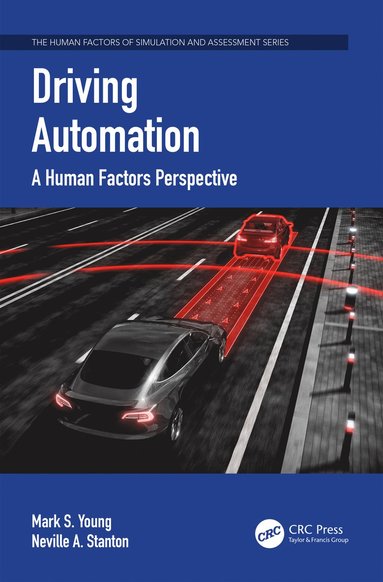
- Format
- Inbunden (Hardback)
- Språk
- Engelska
- Serie
- Human Factors, Simulation and Performance Assessment
- Antal sidor
- 274
- Utgivningsdatum
- 2023-03-10
- Förlag
- Taylor & Francis Ltd
- Dimensioner
- 234 x 156 x 18 mm
- Vikt
- ISBN
- 9780367754457
- 590 g
Driving Automation
A Human Factors Perspective
- Skickas från oss inom 7-10 vardagar.
- Fri frakt över 249 kr för privatkunder i Sverige.
Passar bra ihop
De som köpt den här boken har ofta också köpt Braiding Sweetgrass av Robin Wall Kimmerer (häftad).
Köp båda 2 för 2014 krKundrecensioner
Fler böcker av författarna
-
Simulators for Transportation Human Factors
Mark S Young, Michael G Lenné, Mark S Young, Michael G Lenne
-
Guide to Methodology in Ergonomics
Neville A Stanton, Neville A Stanton, Mark S Young, Catherine Harvey, Mark S Young
-
Systems Thinking Methods in Sport
Scott McLean, Mitchell Naughton, Gemma Read, Neville A Stanton, Adam Hulme
-
Distributed Cognition and Reality
Katherine L Plant, Neville A Stanton
Övrig information
Mark S. Young is a visiting professor, Loughborough Design School, Loughborough University, UK. He has a BSc in Psychology and a Ph.D. in Human Factors and is a Chartered Fellow of the UK Chartered Institute of Ergonomics and Human Factors (CIEHF). His research interests focus on the human factors of transport systems and much of his research has been based on simulators, investigating issues such as driver workload, distraction, and the effects of automation and novel technologies. Neville A. Stanton is a chartered psychologist, chartered ergonomist, and chartered engineer. He is a professor emeritus of human factors engineering in the School of Engineering at the University of Southampton, UK. He has degrees in Occupational Psychology (BSc), Applied Psychology (MPhil), and Human Factors Engineering (PhD, DSc) and has worked at the Universities of Aston, Brunel, Cornell, and MIT. His research interests include modelling, predicting, analysing, and evaluating human performance in systems as well as designing the interfaces and interaction between humans and technology.
Du kanske gillar
-
Proto
Laura Spinney
Häftad -
Nexus
Yuval Noah Harari
Häftad


